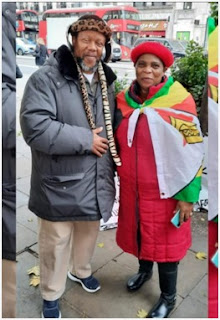14th August,
2024
Zimbabwe has witnessed an alarming escalation in the
unlawful arrests of citizens who criticise the way the country is being run. Over
100 innocent citizens, mainly members of opposition and human rights activists have
been arrested, abducted, tortured and imprisoned in the past few months. These
arrests and abductions have been at the behest of President Emmerson Mnangagwa
and coordinated by state agencies and the ruling ZANU-PF functionaries.
Most of the arrests and abductions were related to lawful
gatherings and based on fabricated charges to silence dissent. The
Mnangagwa-led government has intensified its crackdown, targeting anyone who
dares to challenge its authority or calls for change.
The latest wave of repression began roughly two months ago,
but it is part of a broader pattern of authoritarianism that has characterised
the Mnangagwa regime since its inception. This period has seen an
intensification of efforts to quash opposition in the lead-up to the 2024 SADC
Summit, which Zimbabwe is set to host on August 17.
The recent arrests and abductions of activists include “ the
Avondale 78”, Namatai Kwekweza, Samuel Gwenzi, Robson Chere, and Vusumuzi Moyo.
Among those detained are a mother with her 1-year-old baby and another mother
whose son died whilst she was in remand prison and was denied bail to go mourn
and bury her child. These are heart-wrenching illustrations of the regime’s
complete disregard for basic human decency and international law.
However, this pattern of political violence and repression
is not new. The abduction and arrests of prominent figures like Gandhi
Mudzingwa, Kisimusi Dhlamini, Andrison Manyere, and Jestina Mukoko—a well-known
Zimbabwean human rights activist and director of the Zimbabwe Peace
Project—marked some of the earlier signs of ZANU-PF led government’s
ruthlessness. Jestina Mukoko, who is also a journalist and former newsreader
with the Zimbabwe Broadcasting Corporation, was a notable victim of this
repression.
Another deeply troubling incident occurred on March 9, 2015,
when Itai Dzamara, a prominent activist and journalist, was abducted in Harare.
His disappearance garnered significant international attention and concern,
shining a spotlight on the severe issues of repression in Zimbabwe. Dzamara’s case,
along with many others, underscores the persistent and escalating nature of
political violence under the ZANU-PF regime, which has continued to grow more
brazen in its tactics.
The deployment of the army and police ahead of the 2024 SADC
Summit further reflects an atmosphere of fear and repression in the
country. These recent events are part of
a broader campaign to intimidate the population and stifle peaceful protest or
opposition. The unjust detention of activists, journalists, and even innocent
bystanders under false pretences is a direct violation of Zimbabwean citizens’
constitutional rights, particularly Section 58, which guarantees freedom of
expression, assembly, and peaceful protest.
The ZANU-PF regime, under the leadership of Emmerson
Mnangagwa, bears full responsibility for these egregious violations of human
rights. Since coming to power, Mnangagwa has presided over a government that
systematically undermines democratic principles and has turned the state
apparatus into a tool for repression. The regime’s actions are not only
unconstitutional but also constitute crimes under international law, as they
involve the illegal detention, torture, and harassment of innocent citizens.
These arrests and abuses are taking place across Zimbabwe,
affecting urban centres like Harare and Bulawayo, as well as rural areas where
activists have been organising against the government. The regime’s reach is
extensive, and its crackdown has permeated every corner of the country, leaving
no safe space for those who seek to express dissent or advocate for change.
The root cause of this crackdown lies in the ZANU-PF
regime’s desperation to maintain its grip on power amidst growing public
dissatisfaction and calls for political reform. The Mnangagwa administration is
acutely aware of the increasing discontent among Zimbabweans, who have been
subjected to years of economic mismanagement, corruption, and political
repression. The unlawful arrests are a clear attempt to silence these voices
and prevent the mobilisation of any movement that could threaten the regime’s
hold on power. Through increasingly autocratic measures and strategic
placements of loyalists in key positions, Emmerson Mnangagwa appears determined
to consolidate power and extend his rule in Zimbabwe well beyond 2030, seeking
to entrench his regime’s influence for decades to come.
Unfortunately, the response from regional bodies like the
Southern African Development Community (SADC) has been disappointingly muted.
Despite Zimbabwe’s gross human rights violations, the SADC committee has
largely turned a blind eye to the suffering of Zimbabwean citizens, opting
instead to maintain a stance of non-interference This inaction has emboldened
the Mnangagwa regime to continue its oppressive tactics with impunity.
The international community, particularly human rights
organisations and foreign governments must take a stronger stance against the
Zimbabwean government’s blatant disregard for the rule of law. The failure to
hold Mnangagwa and his regime accountable not only undermines the credibility
of regional and international bodies but also allows the continued suffering of
Zimbabwe’s population.
In recent years, Zimbabwe has seen an exodus of citizens
fleeing the country to escape the abductions, abuse, and torture that have
become commonplace under the ZANU-PF regime. The deterioration of public
services, such as hospitals, clinics, and schools, starkly contrasts with the
luxurious lifestyles of government officials, who frequently seek medical
treatment abroad at the expense of the suffering masses back home.
This ongoing crisis demands urgent attention and action. The
people of Zimbabwe deserve to live in a country where their rights are respected
and their voices are heard. The international community must no longer stand
idly by as the Mnangagwa regime continues to trample on the fundamental
freedoms of its citizens.
#ZanuPFMustGo
#FreeAllPoliticalActivists
#StopViolationOfHumanRights
About
the author
Sakhile Ncube is a human rights activist based in the
United Kingdom. She is a Committee Member in the Executive Committee of the
North Branch of the UK Chapter of Restoration of Human Rights (ROHR) Zimbabwe.
She can be contacted by email at jsakhile@yahoo.com




.jpg)

























